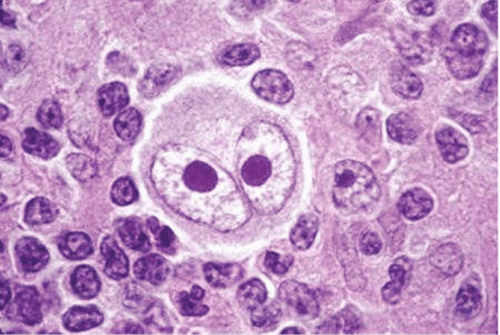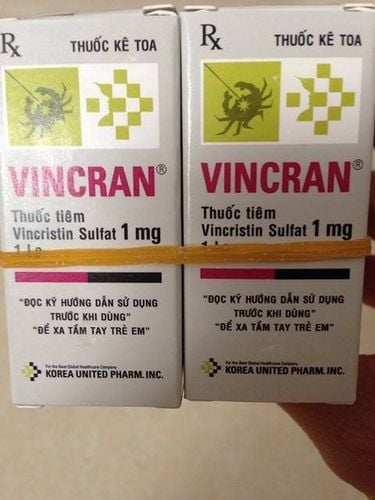This is an automatically translated article.
Dacarbazine 200mg belongs to the group of cancer drugs used to treat certain diseases such as metastatic skin cancer (malignant metastatic melanoma) and Hodgkin's disease. Medicines are often used alone or in combination with other drugs to slow or stop the growth of cancer cells.1. Uses of the drug Dacarbazine
Dacarbazine is a dimethyltriazen-imidazol-carboxamide (DTIC) that has an anti-metabolic effect by inhibiting purine metabolism and nucleic acid synthesis. Dacarbazine is considered to be an alkylating agent that interferes with DNA, RNA and protein synthesis with the strongest effect being inhibition of RNA synthesis. The drug is indicated for use alone in the treatment of metastatic melanoma (melanoma), sarcoma, and in combination with other anti-cancer drugs. Examples include: carcinomas of the colon, ovary, breast, lung, testis, some solid tumors in children, and Hodgkin's disease. Dacarbazine is contraindicated in patients with hypersensitivity to any of the ingredients, pregnant or soon-to-be pregnant women, nursing mothers or people with severe myelosuppression.2. Dosage of Dacarbazine
Depending on the treatment purpose, Dacarbazine will be used in different doses, specifically as follows:
Treatment of malignant melanoma: intravenous dose of 2-4.5 mg/kg/day for 10 days days can be repeated every 4 weeks. In addition, dosing at a dose of 250 mg/m2 body surface area/day, intravenously for 5 days, can be repeated once every 3 weeks Treatment of Hodgkin's disease: intravenous dose at a dose of 150 mg/m2 area body/day, for 5 days, may be repeated every 4 weeks, or intravenously at a dose of 375 mg/m2 body surface area/day, on day 1 when used in combination with other drugs, every 15 days Repeat 1 time Soft tissue sarcoma treatment: 250 mg/m2/day (usually in combination with doxorubicin) for 5 days, repeat every 3 weeks For patients with mild to moderate renal or hepatic impairment, usually No dose reduction needed
3. Dacarbazine side effects:
In some patients when using Dacarbazine, side effects may occur such as:
Leukopenia, thrombocytopenia Anorexia, nausea, vomiting Pain at the site of intravenous injection Fever, myalgia, rash, rash skin redness Mild facial muscle paralysis Hair loss Diarrhea, confusion, blurred vision, convulsions, headache Increased liver enzymes, blood lactate dehydrogenase (LDH) increased, blood creatinine increased, blood urea increased
4. Be careful when using Dacarbazine
Some general notes when using Dacarbazine include:
Dacarbazine is only used for hospitalized patients under the supervision of a specialist with experience in cancer chemotherapy and closely monitored for function. Blood capacity Prevention and treatment of symptoms of acute and delayed vomiting in patients In case of drug out of the blood vessels is often painful and there is a risk of necrosis, it is necessary to stop the infusion immediately and continue the infusion through another vein. If symptoms of hepatic or renal dysfunction or symptoms of hypersensitivity reactions are observed, treatment should be discontinued immediately. If hepatic venous disease occurs, a contraindication to Dacarbazine in this patient population Long-term treatment with Dacarbazine may result in cumulative myelotoxicity, bone marrow failure requiring careful monitoring of white blood cells. , red blood cells and platelet levels. Hematopoietic toxicity may require treatment interruption or discontinuation Some possible drug interactions with Dacarbazine are:
Enzyme inducers such as barbiturates, rifampicin, phenytoin may promote activation Dacarbazine to aminoimidazol-carboxamide Dacarbazine inhibits xanthine oxidase and has the potential to activate drugs such as mercaptopurine, azathioprine, allopurinol. Patients receiving Dacarbazine should not be vaccinated with live vaccines that may compromise the immune response to the vaccine. and increased vaccine side effects. The above are important notes about Dacarbazine that patients need to know. If you have any further questions, you can contact a specialist for appropriate indications.
Please dial HOTLINE for more information or register for an appointment HERE. Download MyVinmec app to make appointments faster and to manage your bookings easily.













